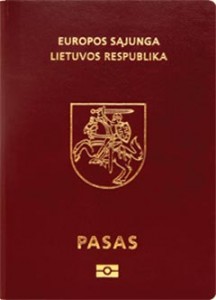VILNIUS — The Lithuanian government submitted a draft law to the parliament Tuesday to legalize the use of non-Lithuanian letters in the Latin alphabet on legal documents.
Since the country’s independence, a person’s legal name has been spelled according to the Lithuanian alphabet and conforming to its pronunciation rules, regardless of how a name was originally spelled. This has been a bone of contention with ethnic Poles living in Lithuania, who use letters such as “w” in their names not found in the Lithuanian alphabet.

Lithuania requires that names on the primary page of a passport and national identification card be spelled in the Lithuanian alphabet regardless of how the bearer typically spells his or her name.
“I think we need to ensure the human right to have the desired name, as is in his or her birth certificate,” Deividas Matulionis, chancellor of the prime minister’s office told the press. “We propose to regulate the written names as much as possible in a simpler, more liberal, people-friendly manner, in accordance with European rules.”
The Seimas has yet to set a date to vote on the proposal and will likely have to ask the country’s Consitutional Court before the bill could become law.
“The Seimas will ask the Lithuanian Constitutional Court before they would adopt this law,” Ramūnas Korsakas, an adviser to the government’s press office told Baltic Reports. “It is not a clear decision.”
Prime Minister Andrius Kubilius expressed confidence that the court will not object to the proposed reform.
“The government proposes to the Seimas to consider a completely new, so far not legalized by law provision that the names of one language hardly consume another language system. Therefore, we do not think that the government’s proposal would be contrary to current doctrine of the Constitutional Court,” Kubilius said in a statement to the press.
In November the Constitutional Court ruled that while non-Lithuanian letters in the Latin script could be used on secondary documents, only the Lithuanian script could be used for the main page of passports and national identity cards. This has become a source of irritation between Lithuania and it’s old partner in empire Poland, with Polish politicians attacking the alphabet restrictions on names as discrimination a violation of bilateral agreements between the countries.













I always wondered why they would rewrite my name Metju instead of Mathieu and not the word on my snikers Naiki instead of Nike.
trust me the irritation did not only come from Poland.
Mat, your name would not be spelled Metju. It would be spelled Mathieu. If your names was Matthew then it would be spelled Matthev (or any other way you would prefer as long as it contains letter that are in the Lithuanian alphabet).
The whole issue is such a hype caused by Poland. Can Poles use their letters in British or German passports with specific Polish letters?
Gentlemen,
Actually, Mat is correct on this one. In the passport the name is spelled according to Lithuanian language rules, regardless of the name’s original spelling.
Regards,
Nathan Greenhalgh
Editor
Baltic Reports
Nathan, Jaay, you’re actually both only partly correct. I have a friend named Edward who would love for his Lithuanian passport to be completely Lithuanianized to read “Edvardas”. He raised a fuss about this, but the passport office replied that they have to stay completely true to the name on the birth certificate, with only the non-Lithuanian letters changing. So “w” can and must become “v” only (and not “any other way you would prefer”), “q” can and must become “kv”. Interestingly, “x” becomes “ks” (as it’s pronounced in English), not “ch” (as it’s pronounced in Russian). Thus, poor Edward is stuck with “Edvard” in his Lithuanian passport.